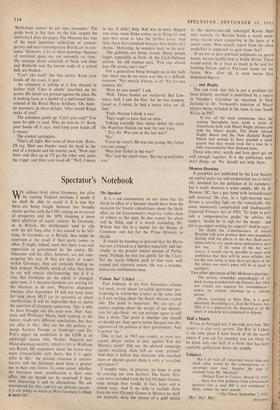Spectator's Notebook
WE seldom think about Germany, but after the coming Federal elections I doubt if we shall be able to avoid it. It is true that 'these are being fought between two broadly similar parties, with the CDU relying on its record of prosperity and the SPD claiming a more ideal platform of social reform. In Germany, as in Britain, the intellectuals tend to ally with the left long after it has ceased to be left- wing. In Germany, as in Britain, they might be surprised at the result if their party comes to office. It might, indeed, seem that there is no real opposition to government by the centre. Dr. Adenauer and his allies, however, are not cam- paigning this way. If they are short of targets within Germany, they are certainly finding no lack without. Probably much of what they have to say will remain electioneering, but if it is true that Germany on the whole is strangely quiet now, it is because Germans are waiting for the elections to be over. Whatever alignment emerges after September 19 will not keep quiet for long about MLF (or its variants), or about reunification. It will be impossible then to shelve the question of Germany tomorrow. That is why we have brought out this issue now. Herr Aug- stein and Professor Mann, both looking at the future, reach very different conclusions, but they are alike in this: they see the old policies to- wards Eastern Europe as bankrupt—and Dr. Frei's report on conditions in the GDR is an additional reason why, Neither Augstein nor
Mann discusses security, which is left to Wolfram von Raven. His arguments about the future may seem irreconcilable with theirs, but it is again alike in this: the present situation is unsatis- factory and the Germans must have a greater say in their own future. To some extent, whether the Germans want reunification is their own affair, but we should not be surprised if they
start discussing it and its alternatives. We are unprepared for this, and for an obvious reason: it is our policy as much as West Germany's which is bankrupt.


































 Previous page
Previous page